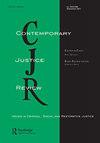The #MeToo movement and restorative justice: exploring the views of the public
Q2 Social Sciences
引用次数: 8
Abstract
ABSTRACT The study examined ‘the day after’ the #MeToo protest, and proposes channeling the outcry of millions of women toward developing and establishing alternative mechanisms for dealing with sexual offences, focusing on restorative justice conferencing. A mixed-methods design (quantitative and qualitative) was employed to empirically examine the public’s attitude toward the #MeToo movement and restorative-justice in sexual offence cases. The findings (n = 252) revealed that the majority of the public supports the #MeToo movement, but not publications that name alleged offenders. Higher levels of support were found among women and people who define themselves as sexual offence victims. A positive correlation was found between support for the #MeToo movement and support for restorative-justice in sexual offence cases. To better understand the quantitative findings, in-depth interviews were conducted with 30 participants. Analysis of the interviews showed that the public acknowledges the importance of the movement, especially due to the widespread discussion on sexual offences and their implications, giving voice to victims, and the possibility that this will help their coping and healing process. Similarly, proponents of restorative justice view the process as an opportunity to conduct a meaningful dialogue, allowing victims to sound their voice and act in a way that suits them.#MeToo运动与恢复性司法:探索公众观点
摘要这项研究调查了#MeToo抗议活动的“第二天”,并建议引导数百万女性发展和建立处理性犯罪的替代机制,重点是恢复性司法会议。采用混合方法设计(定量和定性),实证检验公众对性犯罪案件中#MeToo运动和恢复性司法的态度。调查结果(n=252)显示,大多数公众支持#MeToo运动,但不支持点名指控罪犯的出版物。妇女和自称性犯罪受害者的人得到了更高程度的支持。支持#MeToo运动与支持性犯罪案件中的恢复性司法之间存在正相关。为了更好地理解定量研究结果,对30名参与者进行了深入访谈。对采访的分析表明,公众承认这场运动的重要性,特别是因为人们对性犯罪及其影响进行了广泛的讨论,为受害者发声,以及这将有助于他们应对和治愈过程的可能性。同样,恢复性司法的支持者将这一过程视为进行有意义对话的机会,让受害者能够发出自己的声音,并以适合自己的方式采取行动。
本文章由计算机程序翻译,如有差异,请以英文原文为准。
求助全文
约1分钟内获得全文
求助全文

 求助内容:
求助内容: 应助结果提醒方式:
应助结果提醒方式:


